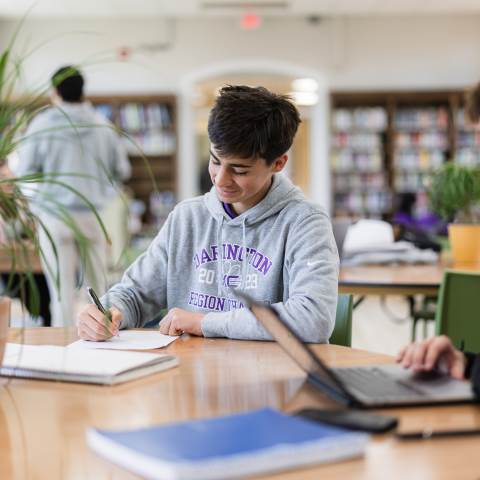

There is a world where technology and literacy fight against one another, where iPads and TikTok are the antithesis of books, and where the former works overtime to undo years of careful efforts from the latter.
That is not the world we live in at Darlington’s Upper School Library. In our world, technology is a tool that we use to promote literacy and show our students that there is no limit to what they can learn, and in turn, what they can achieve.
We use technology every day to engage students and find new ways our services can meet their needs.
While we have a strong collection of print nonfiction resources, our main research databases are digital. Students have access to academic journals and articles as well as other sources from scientists, universities, and more from around the globe.
Pushback from the idea of digital resources might come in the questions like, “What’s wrong with good, old-fashioned encyclopedias? That’s what we used back when I was in school.”
I appreciate a good encyclopedia as much as the next librarian, but when we recognize that the research students do includes ever-changing information, we can understand that digital resources are the medium that allows for that change and therefore, hold the most accurate and up-to-date information.
Consider that a student writing a research paper about the planets would classify Pluto as a planet if using an encyclopedia published before 2005 as their source. A digital resource provides current information, which (unfortunately) has demoted Pluto to a dwarf planet. For historical context, encyclopedias remain useful, but embracing the digital world of research available readily at our fingertips allows us to access the information we need.
We know that social media is a powerful tool. It’s free, it’s accessible, and it has the ability to reach millions of people immediately. Through seemingly silly trends on “BookTok” and “Bookstagram,” (subsets of TikTok and Instagram) bibliophiles have been able to share their reading recommendations with the masses. Dozens of news articles cite the measurable difference this has made in the lives of young people and book sales, too. More people are reading because of social media, and I can use these trending hashtags to ensure I have the most popular titles our students request before they start requesting them.
Accessibility in the library through use of technology can change everything by turning a hesitant reader into an eager one. Our students have access to Sora, a digital library platform that is home to thousands of digital and audio books. With a tool like this, students can read in a format that works best for them. Technology apps like Sora help librarians to break down barriers that have previously separated some students from a love of reading.
Because of advances in technology, we get to connect with the world around us in a more significant and meaningful way, which is something books have helped us do since their inception. In literature, we have a chance to find ourselves, to see others, and to step into those worlds. When we embrace technology in the library, it makes bridging that gap a little easier and allows literacy to enrich our lives for the better.